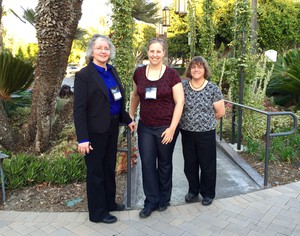Science professors share experience in inquiry-based learning at national conference

CHADRON – The amount of knowledge available instantaneously via the Internet has fundamentally changed the role of teachers from providers of information to developers of critical thinking skills, according to Chadron State College science faculty member Dr. Joyce Hardy.
CSC instructors are adapting to the change with courses that emphasize inquiry-based learning and authentic research experience.
Hardy and fellow faculty members in CSC’s physical and life sciences department, Dr. Ann Buchmann and Dr. Wendy Jamison, shared their experiences with those new teaching methods before an audience of educators from around the country at the annual Lilly Conference on College and University Teaching and Learning in Newport Beach, California, in February. In a presentation at the conference, the three professors discussed the use of case studies, research experiences, inquiry-based labs and problem-based learning in CSC biology classes.
“Teaching is very different from when I started,” Hardy said. “The focus then was for the instructor to organize and synthesize hard-to-find information and present that to students. With the information glut and availability, that role is no longer appropriate. Students have access to far more information than they can possibly use.”
The new role of teachers is to help students determine when they need more information, where to find it, how to evaluate what they find and how to use it to make informed decisions, Hardy said.
“Higher education has really undergone a dramatic change, and the expectations for our students after they leave us have changed significantly,” she said.
Hardy said she and Buchmann have previously been involved in national discussions about how biology instruction should be changed to meet today’s needs, and Buchmann and Jamison have attended conferences on integrating problem-based learning into classrooms.
“All (of us) have been actively involved in changing our classrooms to meet these national conversations,” she said. “These conferences allow us to share what has worked well for us, and our challenges, and to learn from others.”
While the specifics of the new instruction techniques vary depending on the course topic and level, the general framework is to have students learn basic material prior to class, give instructors time to provide a short lecture on topics that may be difficult to understand and then move students into groups for activities, discussions, problems or case studies that allow for more critical learning of the material, Hardy said.
“The national conversation has shifted our focus from memorization to more authentic learning of information,” Hardy said. “The instructor and text book are no longer sole source and students can find and learn through the Internet and each other.”
In scientific fields, research shows that students learn best by doing science, the professors’ said in a description of their conference presentation topic. For CSC biology students, that translates into beginning with courses that introduce and develop scientific inquiry skills, moving to advanced classes that involve authentic research guided by instructors, and ending with courses that include student-directed research.
The Lilly Conference presentation focused in part on CSC’s scaffolding of multiple courses at different levels to develop scientific inquiry skills throughout the curriculum, rather than viewing classes as individual units. That emphasis appeared to be well received by conference attendees, whom Hardy said were thrilled to see examples of integrating student research into multiple classes and the specific methods CSC uses in teaching research skills to freshmen.
Faculty collaboration in teaching both knowledge and skills across different courses is a strength of CSC’s biology program. That’s a good thing for students, according to Hardy.
“Students benefit from gaining learning and critical thinking skills, content knowledge, application of knowledge to make informed decisions and problem solving,” she said. “All of these are necessary to function in any aspect of today’s society.”
CSC faculty members Dr. Mary Jo Carnot, Todd Jamison and Dr. Lara Madison also attended the Lilly Conference, which had over 250 participants from 105 institutions. The Lilly Conference series began in 1981 and now involves about 2,000 participants each year at several different locations around the country.
Category: Campus News, Employee Awards & Achievements, Physical and Life Sciences
